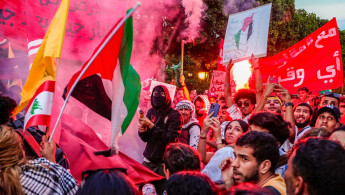Tunisia's police crackdown on pro-Palestine activists after Kais Saied's reelection
In Tunisia, authorities have clamped down on pro-Palestine activists following President Kais Saied's reelection, as police hinted at a potential ban on demonstrations, declaring that "Tunisians don't deserve freedom."
On the evening of 8 October, Tunisian police arrested three prominent activists from the Tunisian Coordination for Joint Action for Palestine: Louay Khammassi, Jawaher Shanna, and her husband, Wael Nawar.
"This evening, activists were arrested following raids on their homes without a legal summons or the presentation of judicial arrest warrants", stated the local pro-Palestine group.
The three activists were released the following morning, 9 October, as investigations continue into their case and that of other group members for allegedly inciting violence during the "Al-Aqsa Flood" protest on 7 October, which marked the one-year anniversary of the Israeli genocide on Gaza.
The protest began at Bab El Hamra, proceeding along Avenue Paris near the French embassy, before culminating on Bourguiba Avenue—a historic street known for hosting the 2011 uprising protests that toppled the Ben Ali regime.
During the protest, hundreds of activists chanted in support of Palestinian and Lebanese resistance, waving flags and brandishing mock rockets emblazoned with the names of Hamas and Hezbollah groups.
Tensions escalated when police prevented the crowd from approaching the French embassy, a building symbolising a long history of colonisation and complicity in decades of Israeli offences against Palestinians.
Protesters attempted to breach the security barrier authorities had erected on Bourguiba Street, throwing bottles of water at police officers.
"The 7 October march will be the last march on Bourguiba Street... and the Tunisian people do not deserve freedom," a police officer warned the protesters.
"Don't chant for the enemies of the nation," he added without further details.
A statement from the Interior Ministry reported that several police officers sustained serious injuries during the protest. Pro-Palestine groups said their members were injured too.
Pro-state media outlet Bila Kinae (Without a Mask) claimed that the protests were infiltrated by "those seeking to create chaos and violence" in this historic street on a significant night for Tunisia—the evening when President Kais Saied was officially re-elected by 90% in a controversial election marked by the disqualification and jailing of his strongest opponents.
"This march, contrary to the deliberately spread rumours, was organised and planned for over a week and has no connection to any recent developments in the local situation or internal affairs," confirmed the pro-Palestine group.
Kais Saied, Palestine and normalisation
The Tunisian Coordination for Joint Action for Palestine asserted that the protest also served as a statement against the state's failure to take real stances against the embassies and interests of countries supporting the genocide, as well as its rejection of the draft law to criminalise normalisation with Israel.
Last November, President Saied interrupted a parliamentary session to postpone voting on a bill to criminalise normalisation with Israel, citing the need to preserve "Tunisia's external security and interests."
Even Saied's most loyal supporters were disappointed by his decision at the time.
The bill, which comprised seven chapters criminalising trade, communication, and any form of cooperation with Israel, was poised to pass by a wide majority before the president's intervention.
Since last year, several reports have suggested a potential normalisation deal between Tel Aviv and Tunis as Israel seeks to expand its influence in North Africa.
However, President Kais Saied has repeatedly ruled out any possibility of establishing diplomatic ties with Israel.
"The word normalisation does not exist for me when it comes to Israel," said Saied in a speech last year.




 Follow the Middle East's top stories in English at The New Arab on Google News
Follow the Middle East's top stories in English at The New Arab on Google News
![A group of Palestinians, foreign and Israeli activists gather to participated in an olive picking event on the land in the town of Battir, which is under threat of confiscation by Israel in Bethlehem, occupied West Bank on 8 November 2024. [Getty]](/sites/default/files/styles/image_330x185/public/2182930803.jpeg?h=199d8c1f&itok=__0LgGsa)

![People gathered around the rubble of destroyed houses to search for survivors [Getty]](/sites/default/files/styles/image_330x185/public/2024-11/GettyImages-2184733820.jpg?h=199d8c1f&itok=NiM1LO2f)